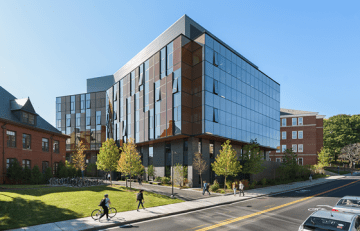Science and Engineering Complex (SEC)
From the very beginning, Tufts Operations Division, led by Barb Stein, vice president for operations, set an explicit goal to make Tufts’ Science and Engineering Complex (SEC) as energy efficient as possible. The project team researched the best performing sustainable buildings at the time and set a target to surpass those achievements. Sustainability was considered in every decision.
These efforts resulted in a building that uses 70% less energy than a typical lab building, which are usually energy hogs compared to other types of buildings, and is certified LEED gold. Instead of demolishing existing buildings and starting new, the project built upon Robinson Hall and Anderson Hall to join them together. This reduced carbon emissions during the building process and reused a large amount of building material.
The SEC also features:
- triple glazing on windows for temperature control
- a solar panel array
- ample natural light
- a rainwater capture system
- an ethical food sourcing café
- efficient heating and cooling, including a heat recovery system that re-captures up to 72% of the building’s heat that would otherwise be lost
The SEC received the Honor Award for the Boston Society for Architecture’s 2021 Sustainable Design Awards, recognizing the SEC as an “outstanding achievement” that “demonstrates the systematic integration of sustainability”, and was chosen by the American Institute of Architects (AIA) Committee on the Environment as a recipient of a 2022 COTE Top Ten Award, the industry’s best-known award program for sustainable design excellence.
To learn more about the SEC’s Gold LEED features, check out this article from Tufts Now.